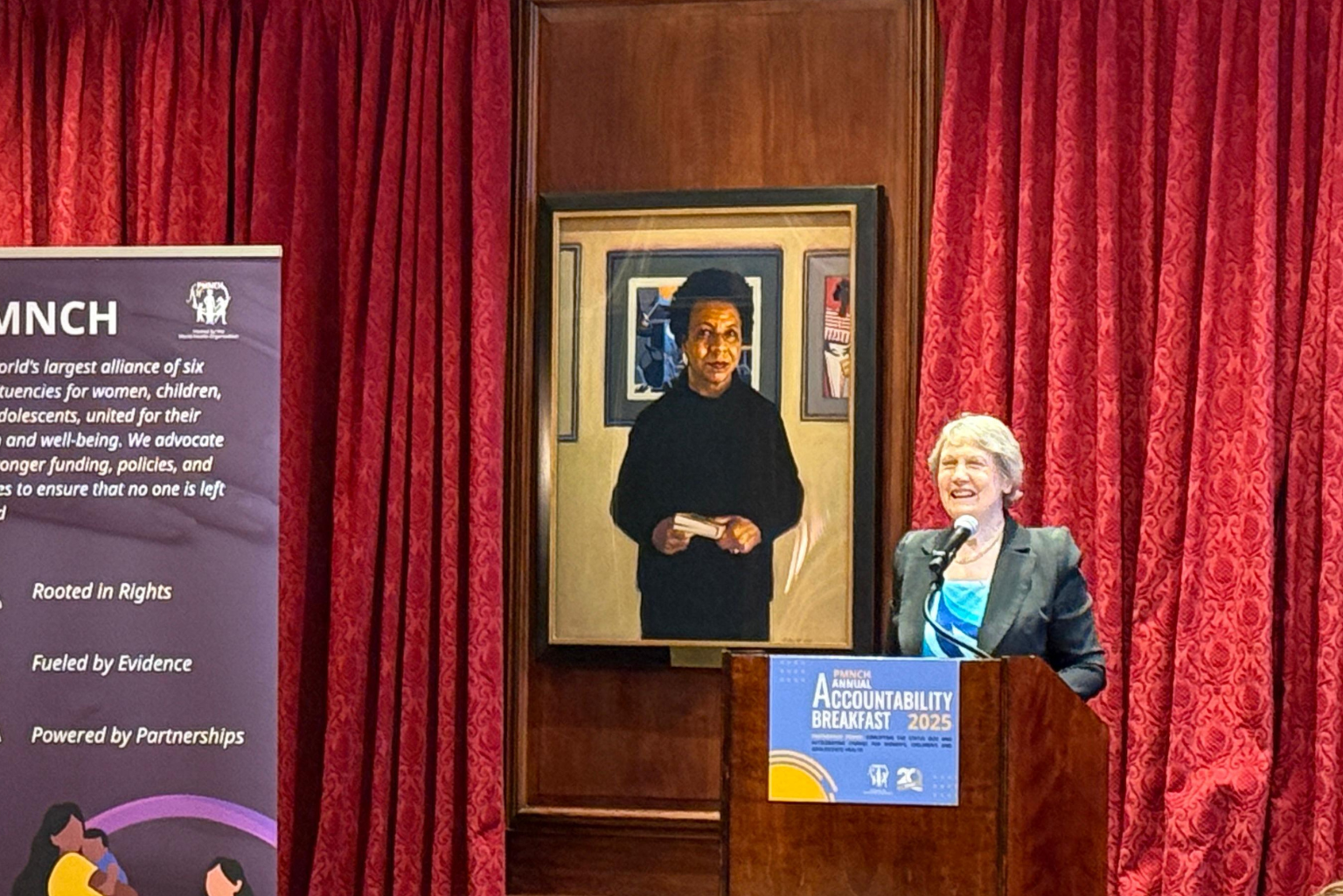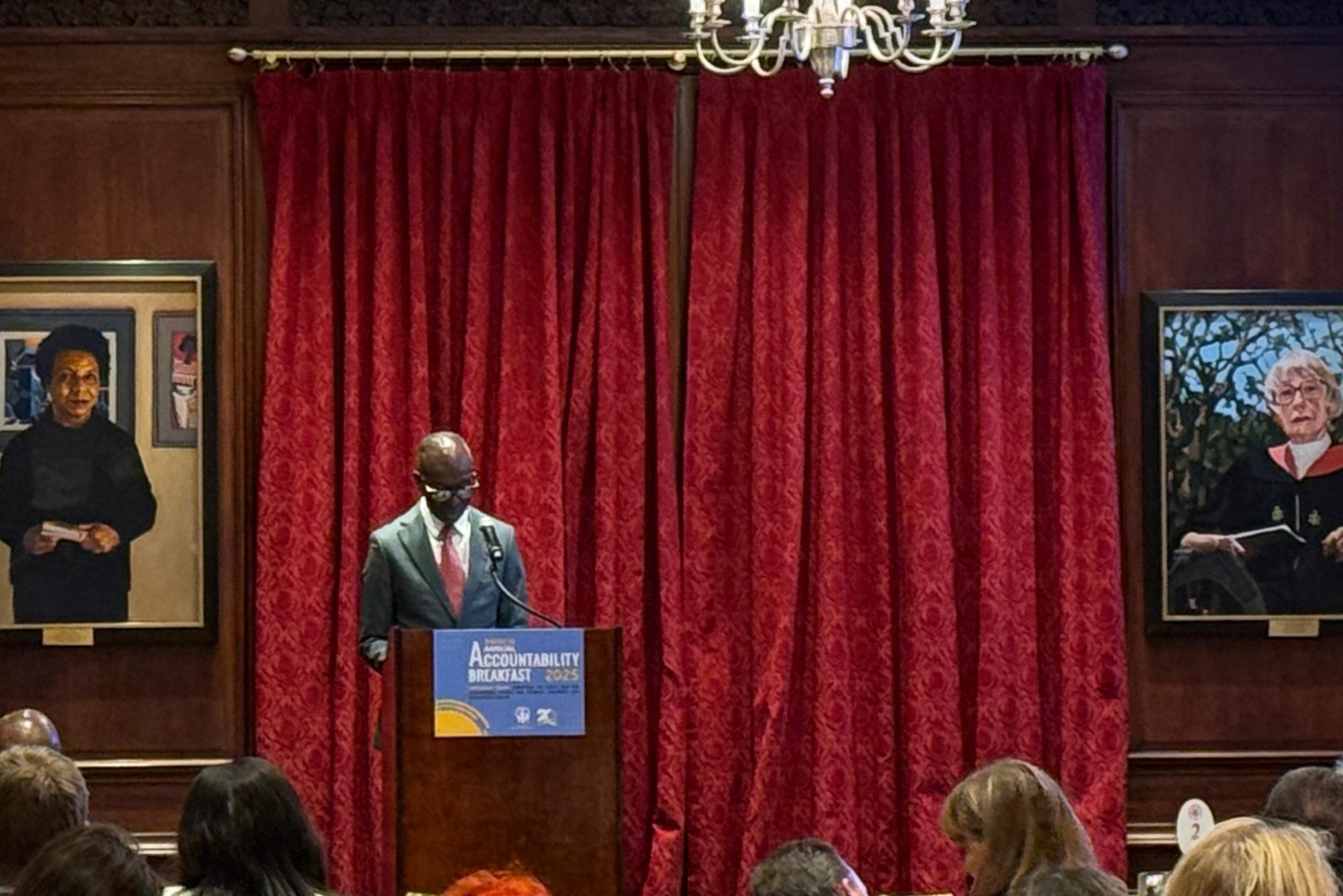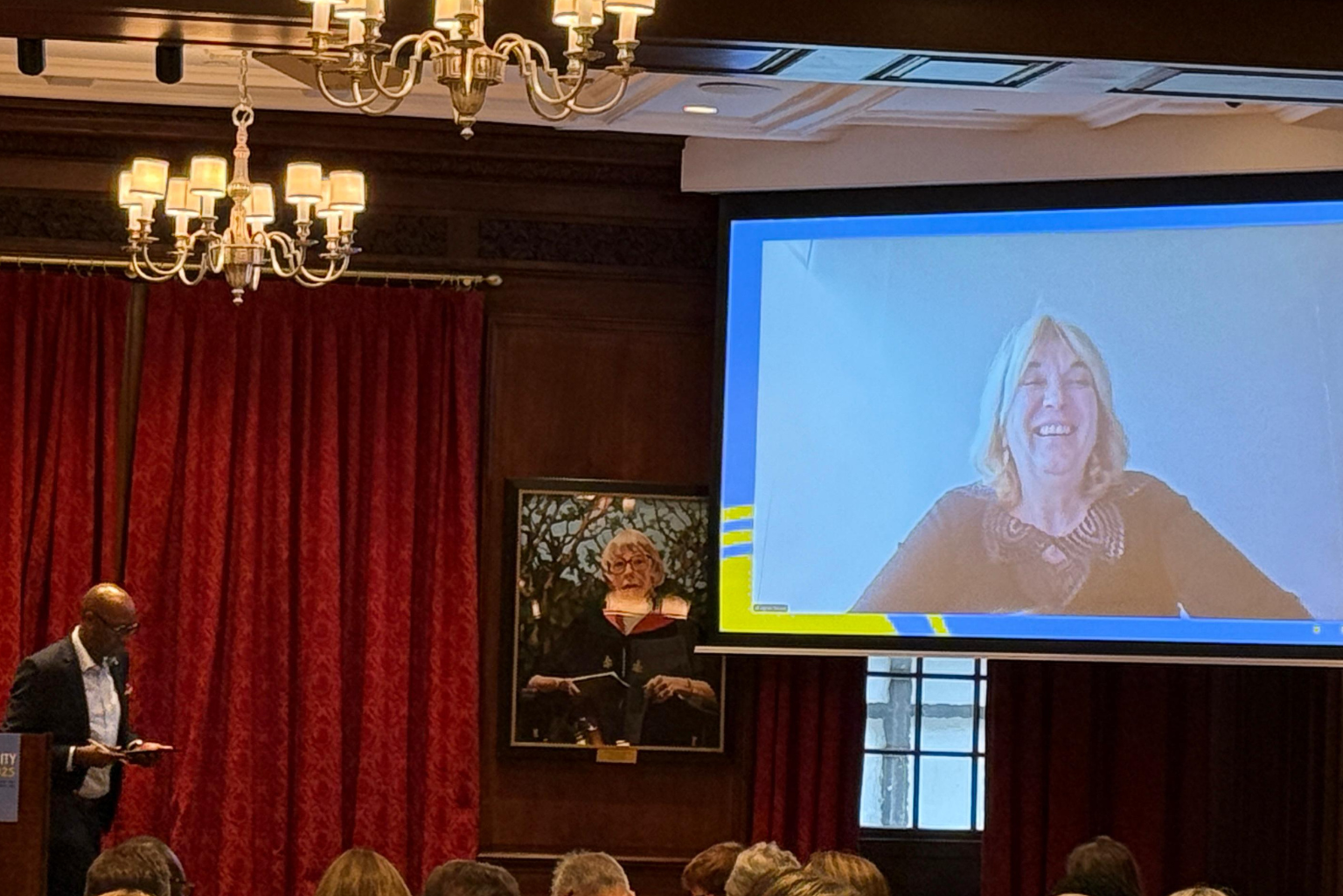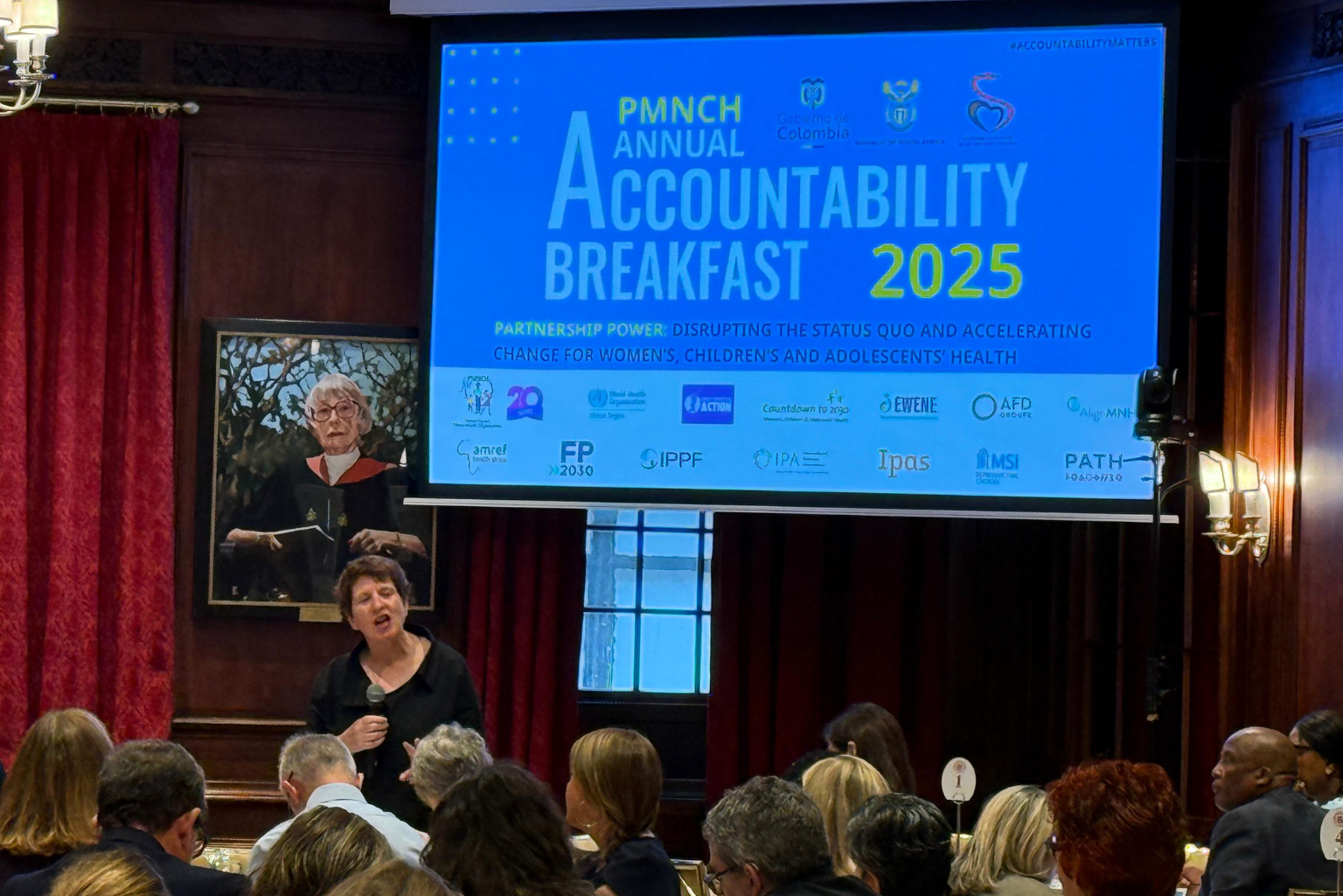Watch the recording
At a time when global crises are multiplying—from conflicts and climate shocks to the erosion of health budgets and growing inequalities, hard-won progress for women, children and adolescents is under threat. This was the urgent message at PMNCH’s 13th Accountability Breakfast, which convened leaders, ministers, civil society actors and health professionals to confront the setbacks in sexual and reproductive health and rights (SRHR), maternal and child survival and adolescent well-being. The gathering underscored a stark reality: the gains of decades can be fragile, and without coordinated leadership, the next generation’s future is at risk.
 Rt. Hon. Helen Clark, former Prime Minister of New Zealand and PMNCH Board Chair.
Rt. Hon. Helen Clark, former Prime Minister of New Zealand and PMNCH Board Chair.
“This is not a time to meet and repeat,” said Rt. Hon. Helen Clark, former Prime Minister of New Zealand and PMNCH Board Chair. “It is a time to reset the narrative, to insist that health and rights are inalienable, and to hold ourselves and governments to account.” Clark’s words framed the morning: a call to move beyond rhetoric toward tangible action, and to recognize that achieving health equity requires courage, innovation and unwavering political commitment.
A pivotal moment for Africa’s future
With Africa poised to be home to two out of every five children born by 2050, the stakes could not be higher. Dr Mohamed Janabi, WHO Regional Director for Africa, painted a vivid picture of the continent’s potential and its peril. “Health is not a cost, it is an investment”, he said. “If every African child can survive, thrive and grow into an empowered adult, the Africa we want will be within reach. If we fail, we risk losing an entire generation’s potential.” His remarks highlighted a central challenge: health interventions are only transformative if they are part of a broader vision of human and social development, connecting maternal and child health to education, nutrition and social protection.
 Dr Mohamed Janabi, WHO Regional Director for Africa
Dr Mohamed Janabi, WHO Regional Director for Africa
Solidarity in the face of fragmentation
Yet, achieving such a vision requires more than national action. Jeremy Farrar, WHO Assistant Director-General, warned that fragmentation, be it within countries, partners and across regions, is an escalating threat. “If we remain divided, the outside world will hear only fragmentation. In three or four years, it will be extraordinarily difficult to turn the tide. The next critical years demand that we put aside differences and define a common future.” Farrar’s remarks stressed that coordination, leadership and mutual accountability are not optional; they are fundamental to sustaining progress in the face of shrinking global resources.
Financing justice, not just systems
For decades, the world has witnessed rising health expenditures, yet Agnès Soucat of Agence Française de Développement noted that inequities persist. “Despite decades of rising health spending, cracks remain. We need structural reforms that bring resources to where they matter most: the frontline, where equity is won or lost.” She called for greater domestic investment, complemented by regional pooling of resources and innovative global financing mechanisms. The message was clear: without deliberate financial planning that centers equity, health systems will continue to leave the most vulnerable behind.
 Agnès Soucat of Agence Française de Développement
Agnès Soucat of Agence Française de Développement
Pushback on rights, a pushback on democracy
In parallel, the political landscape itself threatens to roll back gains. Kate Gilmore, Chair of IPPF, framed the erosion of sexual and reproductive rights as a deliberate strategy. “The erosion of sexual and reproductive rights is not incidental: it is a political strategy. Rolling back SRHR undermines democracy itself. We are in a pitched battle against forces that thrive on inequality and seek to shrink the state and silence communities. We cannot underestimate what is at stake.” Her intervention reminded participants that defending health is inseparable from defending justice and inclusion.
 Kate Gilmore, Chair of IPPF
Kate Gilmore, Chair of IPPF
Voices from the ground
Civil society actors brought these threats into stark human terms. Simon Cooke of MSI Reproductive Choices described women queuing for contraception, sometimes for the first time in their lives, amid dwindling supplies. “Adolescents are at the front line of denial and they are demanding services we cannot afford to cut.” In humanitarian settings, the situation is even more severe. Anu Kumar of Ipas described the silent epidemic of sexual violence and unsafe abortion in crises: “At least one in five women in humanitarian settings has experienced sexual violence. Without access to emergency contraception or safe abortion, the consequences are devastating.”
Collaboration for impact
Prof. Joseph Haddad, President of the International Pediatric Association, emphasized that advancing health for women, children, and adolescents requires breaking down professional silos. “Safeguarding the rights of others is the most noble and beautiful end of a human being,” he said. He highlighted how integrated care networks, community health workers, and telehealth are helping teams improve access and quality of care for the most vulnerable.
Political leadership in action
Ministers from Senegal, South Africa, Sierra Leone and Colombia highlighted how national leadership and strategic action are saving lives, even amid constrained resources.
Senegal: Cutting maternal and neonatal mortality through targeted investment
Dr. Ibrahima Sy, Minister of Health and Social Action of Senegal, highlighted the country’s remarkable gains in maternal and neonatal mortality ratios. Dr. Sy attributed these gains to strengthened community health networks, increased availability of services for pregnant women and investment in trained health workers. He emphasized resilience and adaptive health systems, alongside partnerships bridging international support with local implementation. “Our progress shows that strategic investments in health systems, combined with partnerships, can dramatically save lives.”
South Africa: Integrating technology and community health for UHC
Dr. Aaron Motsoaledi, Minister of Health of South Africa, highlighted the importance of holistic, data-driven approaches to Universal Health Coverage. Using initiatives like the MomConnect digital platform, nearly six million women have received tailored maternal health services. Health was framed as a continuum from early childhood to senior citizens, interconnected with education, infrastructure and social services. “Health is not an end in itself; it is part of a mindful, national strategy to ensure every citizen can thrive.”
Sierra Leone: Health as a foundation for nation-building
Dr. Austin Demby, Minister of Health of Sierra Leone, emphasized the integration of health with education, food security and economic growth. By prioritizing human capacity development and aligning programs to community needs, Sierra Leone has achieved notable reductions in maternal and child mortality while building trust in local health services. Principles of alignment, acceleration and accountability guide national programs. “Health is a cornerstone of nation-building. It must be strategic, inclusive and accountable.”
Zambia: Political will driving health for the next generations
Zambia demonstrates how political will can save lives even amid economic and environmental challenges. By prioritizing maternal, child and adolescent health, investing in ambulances, adolescent centers, training of community health workers and leveraging partnerships, the country is reaching remote communities and focusing resources where they matter most. “When you have a healthy child, everything follows”, Dr. Elijah Muchima, Minister of Health of Zambia, emphasized, underscoring that commitment, innovation and collaboration are essential to protect the next generation.
Colombia: Global solidarity and South-South cooperation
Amb. Arlene B. Tuckner stressed the importance of global solidarity in protecting SRHR. Highlighting threats of funding cuts and misinformation, she called for multi-sectoral alliances, South-led cooperation and civil society engagement. She shared Colombia’s commitment to promoting best practices in midwifery, gender and SRHR across the Global South, and invited participants to the upcoming International Conference on Family Planning (ICFP 2025) in Bogotá. “Global solidarity and South-South cooperation are critical to defend the rights and lives of women and children worldwide.”
A call for courage
Closing the event, Rajat Khosla, PMNCH Executive Director, urged participants:
“What is needed now is not just hope, but courage. Courage to defend rights, sustain partnerships and turn commitments into measurable progress. The world’s women, children and adolescents deserve nothing less.”

.png?sfvrsn=6d0e27cd_1)



